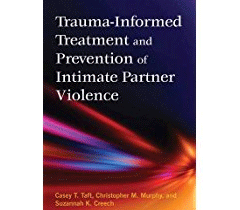Trauma-Informed Treatment & Prevention of Intimate Partner Violence

“Trauma-Informed Treatment & Prevention of Intimate Partner Violence.”
By Casey T. Taft, Christopher M. Murphy, and Suzannah K. Creech
American Psychological Association
Washington, D.C., 2016
Book examines the impact of trauma
Reviewed by Kerry Morrison, Psy.D.
Trauma, especially childhood trauma, is life altering. It has pervasive effects on all spheres of functioning and relationship development.
Trauma also can hinder therapeutic relationships that attempt to treat interpersonal violence. Models of treatment for intimate partner violence must be trauma-informed and recognize the multitude of ways trauma impacts behavioral change.
Trauma-informed care has recently been recognized as essential for treatment of survivors of domestic violence, but until this publication, it has not been seen as necessary for treating perpetrators of intimate partner violence (IPV).
The link between childhood trauma and, abusive and violent behavior in adult intimate relationships has not been well understood despite decades of research demonstrating higher rates of trauma exposure among individuals who engage in IPV.
The goal of this book is to help clinicians understand the relationship between early trauma exposure and IPV in adulthood by increasing knowledge and skills to deliver effective trauma-informed services.
Recognition of this relationship is overdue. Those providers who have worked with domestic violence and other violent behaviors have long understood that most perpetrators have horrific histories of childhood trauma and suffer from posttraumatic stress disorder.
Yet not all treatment approaches have formally recognized this and in turn, they have resulted in incomplete clinical care. There has been a movement in counseling in general and in the IPV field, to better train clinicians in trauma and its effects, but as the authors’ note, at the time of publication, there has been no single resource that focuses on this issue.
Work with military veterans has highlighted the importance of addressing trauma in treatment. The model proposed in this book is relevant for military, forensic and civilian populations.
Practitioners who work with violence within relationships can benefit from this material by improving their knowledge and skill set. The authors’ premise is that individuals who engage in IPV experience deficits in social processing, have increased anger and aggression and choose less socially competent responses to challenging relationship events.
They provide information on individual, group, couples and couples group treatment models. The authors’ responsibly address the controversy over couple’s treatment, specifically the ethics and safety of treating IPV.
They advocate treating low levels of situational couple violence within an outpatient setting. Higher levels of IPV such as those court-mandated perpetrators may be better served with more structured, highly restrictive settings.
One criticism is that there is not information specifically on utilizing this approach for same-sex couple IPV and whether or not modifications need to be made. Nevertheless, the case examples and assessment tools (appendix) provided are excellent.
There is an Anger Analysis Form that I think will be very helpful for any clinician that works with anger. In closing, I think this is a welcome and important resource for any provider who works with IPV, other forms of violence and forensic issues.
Kerry Morrison, Psy.D., is a psychologist for the Department of Developmental Services in the Central/West Region of Mass., who also has a private practice, consults, teaches and provides training on a range of mental health topics.
Learn more about the book: Trauma-Informed Treatment and Prevention of Intimate Partner Violence
